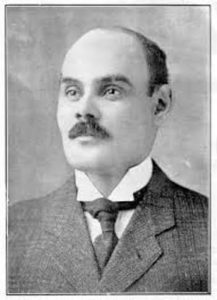
Daniel Desdunes (1911)
*The birth of Daniel Desdunes is celebrated on this date, c.1873. He was a Black Creole activist and musician.
Daniel F. Desdunes was born in New Orleans to Rodolphe Lucien Desdunes and Mathilde (Cheval). His father was a customs agent, civil rights activist, journalist, historian, and poet. His siblings were Agnes, Louise, Coritza, and Wendelle. In 1879, his father started a relationship with Clementine Walker and had at least four children: Mary Celine, John Alexander, Louise, and Oscar (1892). Mary Celine later became known as Mamie Desdunes, a blues pianist.
Clementine lived near Jelly Roll Morton's godmother and was a neighbor of Morton's mother. From this proximity, Morton learned the song he later recorded as "Mamie's Blues" or "2:19 Blues" and attributed to Mamie, singing, "Can’t give a dollar, give a lousy dime, / I wanna feed that hungry man of mine." Other associates of Mamie included performer Bunk Johnson and promoters Hattie Rogers and Lulu White. Clementine Walker died September 23, 1893.
Young Desdunes attended public schools in New Orleans and went to Straight University. After college, he worked as a house painter and music teacher. In 1895, Desdunes married Victoria Oliver. They had a son, Clarence, and Victoria died shortly afterward. Descended from a family of people of color free before the American Civil War, on February 24, 1892, he volunteered to board a train car designated for whites in violation of the Louisiana 1890 Separate Car Act. This test case would enable the New Orleans Comité des Citoyens to challenge the law in the courts. The train he boarded was interstate, and the court found that the law did not apply to such cases, which were bound by federal law and regulation. Shortly later, another member of the Comité des Citoyens, Homer Plessy, was selected to board an intrastate train. He was arrested for refusing to leave the white car and what became Plessy v. Ferguson (1896).
In the meantime, Desdunes became a musician, directing bands, orchestras, and minstrel shows and playing many instruments, including the coronet, the violin, the baritone horn, and the trombone. He performed under the direction of Perry George Lowery in P. T. Wright's Nashville Students and under Harry Prampin in Lash E. Gideon's Grand Afro-American Mastodon Minstrels and Gideon's Big Minstrel Carnival. Desdunes married Madia Dodd a second time. Desdunes lived in New Orleans and Chicago. In 1904, he and his second wife moved to Omaha, where he lived the rest of his life. In 1904, Desdunes moved to Omaha.
His band became a fixture in civic life, and he also led the Boys Town Band at Boys Town. He was described as the "father of negro musicians of Omaha" in Harrison J. Pinkett's 1937 manuscript, "An Historical Sketch of the Omaha Negro."Dan Desdunes died of spinal meningitis on April 24, 1929.
Omaha historian Jesse J. Otto cited testimony which noted that Dan Desdunes' New Orleans band was well known as early as 1892 for their "novelty" of "swinging the beat." "This style is one of the defining characteristics of Jazz; thus, this testimony places Desdunes as one of the very first musicians in history to play Jazz." Otto also argues that Desdunes created a culture of teaching and nurturing in Omaha's Black community that produced artists like Lloyd Hunter, Preston Love, Wynonie Harris, Lester Abrams, Buddy Miles, and Luigi Waites.
His funeral was held at St. Philip's Episcopal Church, and he was buried at Forest Lawn Cemetery; his wife, Madia, died on March 3, 1930.